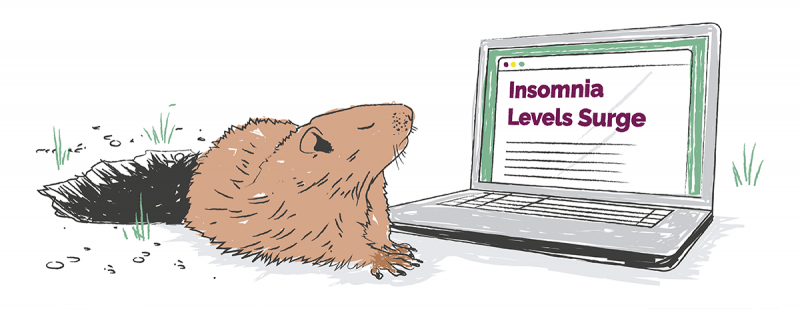What day is it? If you’ve felt stuck in a kind of repetitive cycle of déjà vu recently, reminiscent of groundhog day, with days and nights, weekdays and weekends blurring together, you’re not alone.
Ongoing uncertainty and disrupted routines are contributing to a surge in insomnia. It’s negatively affecting our health and productivity, yet so many of us choose to ignore it.
Consistently struggling to fall asleep, or regularly experiencing poor quality sleep for whatever reason, can lead to long-term health impacts including anxiety, depression, obesity, cardiovascular disease and diabetes.

Sleep insufficiency – which many health authorities classify as less than seven hours a night – also affects your work; many studies have shown that it makes you more likely to make mistakes, wrecks your concentration, increases reaction times and affects your moods.
We all have off-days, but if you’re noticing an ongoing lapse in concentration during working hours, it’s time to consider making some serious changes to your routine. So, what can we do about it?
Get outside
While we may believe that the lack of commute is providing a magical extra hour or two in the day, time spent outside and on the go is actually a key to a good night’s shut eye. Both daylight and exercise help us to regulate our circadian rhythm: the secret to the perfect sleep-wake pattern.
You’ve probably noticed a reduction in sleep quality after a few days of maximum work, minimal play – and this is part of the problem. Aim to create your own ‘commute’, or try leave the house to stretch your legs in the morning, or around lunchtime, if you can.
Be tech-savvy
What’s the first thing you look at in the morning, and the last at night? We’re all guilty of blurring the differentiation between work and home, which inevitably wreaks havoc with our brain’s associations. Taking your phone to bed to quickly finish some emails may feel innocent, but it’s one fast way to re-wire your brain’s conditioning. Keep ‘zones’ for work, play and rest wherever possible.
This can also apply to our media consumption. We’re experiencing a negative news overload at the moment, and while it may be tempting to stay informed at all hours, it’s wreaking havoc with our stress levels. Work on limiting your news consumption to avoid anxiety, and try setting up a late evening blue light filter on your phone.
Track your sleep
If you’d like to take your sleep tech one step further, consider investing in a sleep-tracking app, such as Sleep Cycle. It analyses your breathing and sleep sounds to give an idea of how much deep sleep you’re actually getting – which if you’re anything like me – may surprise you. Who knew I snored that much? Bonus feature: it records sleep talking. Hilarious.
Put your health first
You probably know most of this already, but we do need to be reminded every now and then to maintain a healthy routine. High levels of productivity will be a key component in post-covid recovery for many businesses in the months ahead, and addressing your sleep now could make all the difference.
We lead busy lives and it’s all too easy to ignore the signs, but if you’re able to put your health first, everything else will fall into place.
If you’d like to gain further insight into how ORESA can help you maximise your company’s growth in 2021, speak to our team today to see how we can help with your executive hires: +44 (0) 203 675 1459 or email Orlando Martins at [email protected].
















